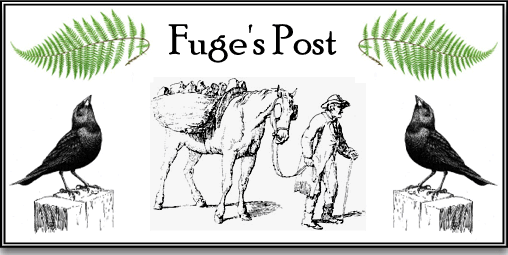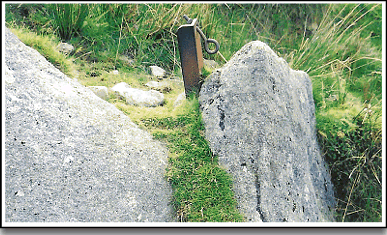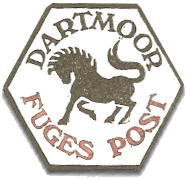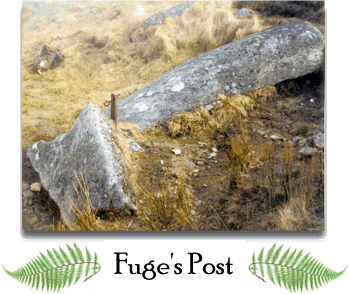
Now here is a challenge for anybody who has not been to Fuge’s Post and does not know what it looks like. Pick a wet, foggy day, equip yourself with a map and a grid reference of SX 57153 81962 and go and find it. That was exactly what I had to do on my first visit to Fuge’s Post and after many hours it soon became the ‘Effing Post’. Ok so why go looking for it in the first place, well I had read about it and there were some letterboxes off it, as simple as that. The reference I am referring to was found in Hemery’s book, ‘High Dartmoor’ on page 940, it read:
“In a green gully above the headmire, backed by a large black peat bank, tinners have worked, and a latter-day moorman¹ has driven a stake with tethering ring into the bank against a granite slab. – 1. Mr Reg Fuge of Brousentor Farm.”
Bear in mind there was no GPS to lead me by the hand and assumption is a dangerous thing. Having read the above extract I had assumed that by, “a stake” Hemery was describing something akin to an RSJ. Wrong, Hemery was describing something more along the lines of a small length of angle iron. I would not be exaggerating to say that the time spent finding Fuge’s Post must have been the most frustrating couple of hours I have ever spent. It is a good job there was nobody else present as I have not got the calmest of tempers at the best of times. However, eventually the stake and ring were found along with the associated letterboxes.


Letterbox stamp
But what was the purpose of Fuge’s Post? To see this it is probably as well to realise exactly where it is located. It is sited at the head of the which was an old track used by the peat cutters for fetching their ‘black gold’ off the moor. Where the track ends is the point at which the ground becomes very hard to cross due to the peat hags. So when Mr Fuge and many moor farmers like him were going to the moor they would travel out as far as possible on horse back and then tether the horse/pony and proceed on foot. There are many such tethering places on the moor but the majority of them are simply rings attached to rocks or boulders – known as ‘Ring Rocks’.

There are numerous ‘ring rocks’ on Dartmoor and probably others that have not been discovered but the list below comprises of the more well known examples that can be found on the northern moor.
| Amicombe Hill | SX 57431 85915 |
| Buttern Rocks | SX 65301 88703 |
| Fuge’s Post | SX 57153 81962 |
| Fur Tor | SX 58807 83103 |
| Great Stannon Newtake | SX 63654 81352 |
| Rattlebrook | SX 55903 85952 |
| Tavy Head | SX 59250 81354 |
| Tavy Hole | SX 58052 81856 |
Further reading:
Paul, R. 2001 Ring Rocks of Northern Dartmoor, Dartmoor Magazine, No.63, Quay Pub. Brixham.
 Legendary Dartmoor The many aspects past and present of Dartmoor
Legendary Dartmoor The many aspects past and present of Dartmoor
